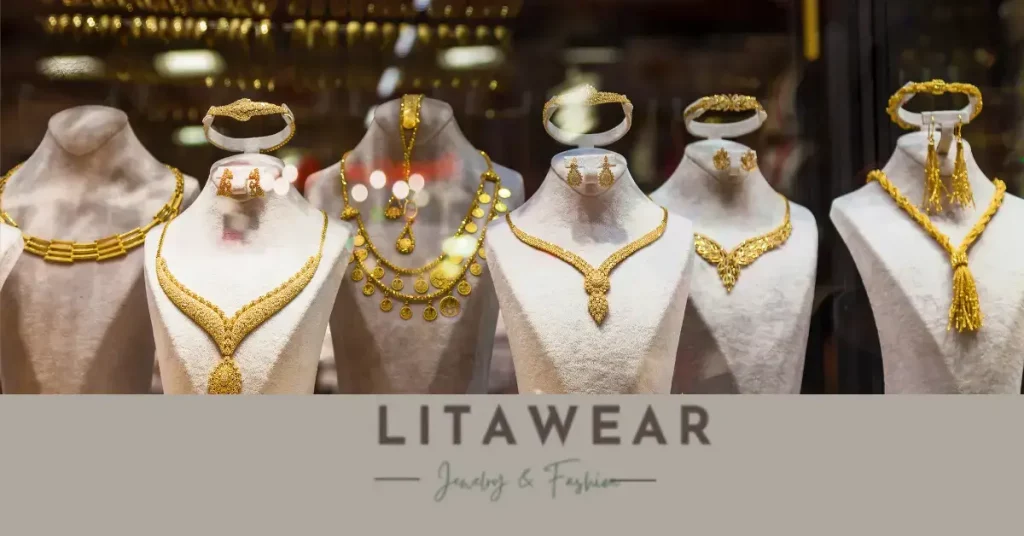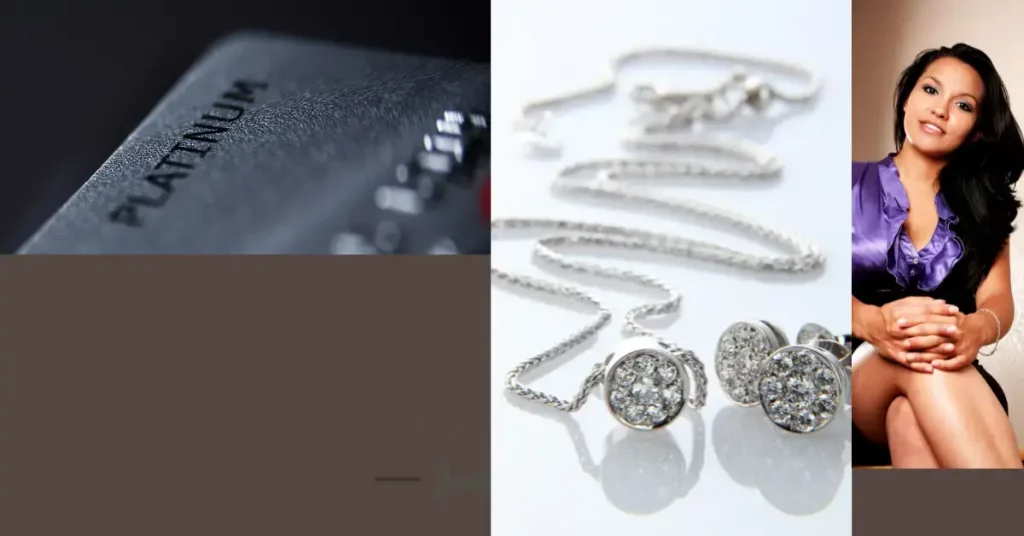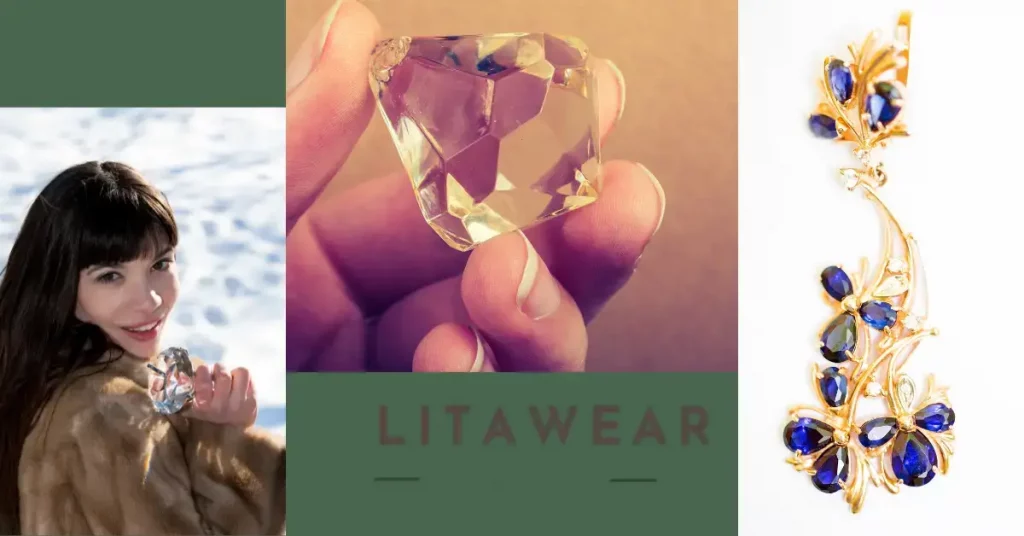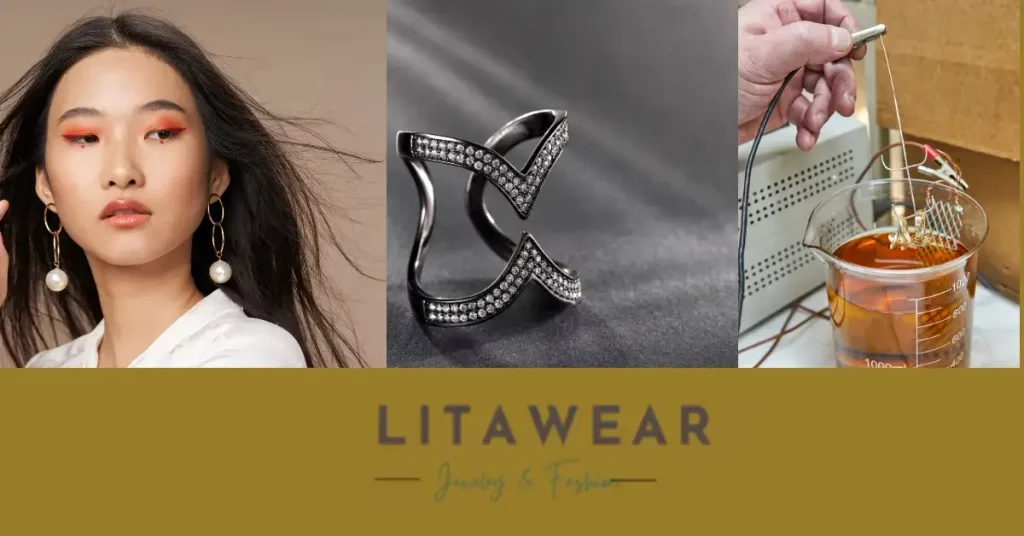Do you love wearing your jewelry all day long, however rightfully wonder what jewelry can you wear in the shower.
The good news is that I have five sisters and know by now that some types of jewelry can withstand the water and others that can’t.
In this guide, we’ll go over together what jewelry you can safely put on, avoid and therefore preserve.
What Earrings Are Safe To Wear In The Shower?
Earrings are a popular accessory, but not all types of earrings are suitable for the shower. The best type of earrings to wear in the shower are solid gold earrings, as they are durable and do not tarnish.
It is also safe to wear diamond earrings in the shower, as they are very durable and can withstand water.
Can you shower in Diamond jewelry?

While it is safe to wear diamond earrings in the shower, it is not recommended to wear other diamond jewelry, such as diamond rings or necklaces.
This is because the water can cause damage to the metal prongs that hold the diamond in place, which can lead to the diamond becoming loose or falling out.
The Best Metals For Jewelry To Wear In The Water
If you’re looking for other types of jewelry that are e.g. tarnish resistant in the shower despite repeated exposure to fluids you should consider jewelry made from certain types of durable metals.
Meaning, that can withstand harsh cleaning liquids, soap residue, and other substances.
Stainless steel jewelry is a great synthetic material as it is durable and does not tarnish or rust.
Gold filled jewelry is also a good option, as it is resistant to water damage or sensitive skin, and can last for years.
4 Pieces of Jewelry You Can Wear in The Shower
In addition to yellow gold earrings and diamond earrings, there are other types of high quality jewelry that are safe to wear in the shower.
These include platinum jewelry, 14K and 18K gold jewelry, and rhodium-plated jewelry. These types of jewelry are durable and can withstand liquids.
Can You Wear Hypoallergenic Earrings In The Shower?
While hypoallergenic earrings are designed to be gentle on the skin, they may not be the best choice for the shower.
This is because the water can cause the earrings to become dull or tarnished, which can lead to skin irritation due to a sensitive reaction.
It is best to stick with solid gold or diamond earrings when showering.
Can you shower in Stainless Steel jewelry?
Yes, wearing stainless steel jewelry when showering usually causes no harm to the item, as it is durable and does not tarnish or rust. It is also resistant to water damage, making it a good choice for everyday wear.
Can you shower in Gold Filled jewelry?

Gold-filled jewelry is a great choice for showering, as it is resistant to water damage and can last for years.
However, it is important to note that gold-filled jewelry may tarnish over time, especially if it comes into contact with soap or other chemicals.
Can you shower in Gold Vermeil jewelry?
In general, gold vermeil jewelry is not recommended for showering or swimming, as the water and soap can cause the gold plating to wear off more quickly.
Additionally, the gold layer may react with the chlorine or other chemicals found in pool water, leading to discoloration or damage.
It is best to remove and not wear gold vermeil jewelry before exposing it to water to ensure its longevity.
Hypoallergenic Earrings May Not Be The Best Choice For All Occasions
While hypoallergenic earrings are designed to be gentle on the skin, they may not be the best choice for all occasions.
This is because the water can cause the earrings to become dull or tarnished, which can lead to skin irritation.
It is best to stick with real gold or diamond earrings when showering.
Can you shower in Silver Plated jewelry?
Be it rings, bangles, or charms, silver plated jewelry is not recommended for showering, as it can become tarnished and discolored when exposed to water.
It is best to stick with other types of jewelry, such as yellow gold or stainless steel.
What Jewelry Can You Wear In The Water?
If you’re planning on swimming or participating in water sports, certain types of jewelry are safe to wear in the water.
These include platinum jewelry, 14K and 18K gold jewelry, and rhodium-plated jewelry.
However, it’s important to note that even though these types of jewelry are safe to wear in the water, they can still become scratched or damaged over time.
So, taking them off before engaging in any water-related activities is always a good idea to prolong their lifespan.
Platinum Jewelry

Platinum is a durable and corrosion-resistant metal that makes it a popular choice for jewelry worn in the shower or pool.
However, it is important to note that certain gemstones may not be suitable to wear with platinum pieces in the water.
For example, emeralds are relatively soft gemstones and may be damaged by exposure to water over time.
Can you shower in Sterling Silver jewelry?
Sterling silver jewelry is another popular option for everyday wear, but it is essential to take care when wearing it in the water.
While sterling silver is generally safe to wear in the shower, it can tarnish and become damaged over time with exposure to water and other chemicals.
It is best to remove or wear sterling silver jewelry just before swimming in a pool or hot tub, as chlorine and other chemicals can be particularly damaging.
Chlorine And Precious Stones: A Tolerant Combination
While chlorine is known to be harsh on some types of jewelry, such as silver and copper, it is generally safe to wear jewelry with precious stones in chlorinated water.
Precious stones like diamonds, sapphires, and rubies are generally resistant to the effects of chlorine and other chemicals, making them safe to wear in the pool or shower.
Can you shower in Gold Plated jewelry?

Gold-plated jewelry from earrings to popularity rising anklets can be a great option for those who want to wear their favorite pieces in the water without risking damage to more expensive pieces.
Nevertheless, it is important to note that gold plating can wear off over time with exposure to water and other chemicals.
It is best to remove gold-plated jewelry before swimming or showering or to opt for solid gold or gold-filled jewelry if you want to wear something in the water regularly.
Can you shower in tungsten jewelry?
Despite its popularity in recent years due to its durability, scratch resistance, and affordability:
Tungsten jewelry it is important to note that tungsten is a heavy metal, and wearing it in the shower can potentially cause skin irritation and discomfort.
Additionally, prolonged exposure to water can cause tarnishing and damage. It is generally recommended to remove tungsten jewelry before showering or swimming to ensure its endurance.
Diamond Jewelry
Diamonds are known for their durability and resistance to damage, making them a popular choice for jewelry pieces that can be worn in the shower or pool.
Nevertheless, it is important to note that diamonds can become loose or fall out of their settings with exposure to water and other chemicals.
It is indispensable to regularly inspect diamond jewelry for loose or damaged stones and to have them repaired by a professional jeweler as needed.
Jewelry Brands You Can Shower In
Many jewelry brands offer pieces specifically designed to be worn in the water.
For example, Pura Vida Bracelets offers a line of waterproof bracelets made from wax-coated string, while QALO offers silicone wedding bands that can be worn during water-based activities.
These brands and others like Pandora Jewelry I nearly worked for, offer a great option for those who want to wear jewelry in the water without risking damage to more expensive pieces.
Can you shower in Cubic Zirconia Jewelry?

Cubic zirconia is a popular diamond alternative that is often used in jewelry because of its affordability and durability.
While cubic zirconia is generally safe to wear in the shower or pool, it is important to note that it may become dull or cloudy over time with exposure to water and other chemicals.
It is best to remove cubic zirconia jewelry before swimming or showering if you want to keep it looking its best.
Pearl Jewelry
Pearl jewelry can be a beautiful and elegant choice for special occasions, but it is generally not recommended to wear in the shower or pool.
Pearls are delicate and porous, and exposure to water and other chemicals can damage the surface of the pearls and cause them to lose their luster.
It is best to remove pearl jewelry before swimming or showering and to store it carefully to prevent damage.
Can you shower in 18K Gold jewelry?
18K gold is a popular choice for fine jewelry because of its durability and resistance to tarnishing.
While 18K gold is generally safe to wear in the shower or pool, it is important to note that it may become scratched or damaged over time.
Here are some things to keep in mind when wearing 18K gold jewelry in the water:
- Avoid wearing 18K gold jewelry in chlorinated water or saltwater, as it can cause discoloration and damage.
- Rinse the jewelry thoroughly with clean water after swimming or showering to remove any residue or buildup.
- Use a soft cloth to gently pat dry the jewelry to prevent scratches or damage.
- Avoid using harsh chemicals or abrasive materials to clean the jewelry, as this can cause damage to the metal and any gemstones.
By following these guidelines, you can enjoy wearing your 18K gold jewelry in the shower or pool without worrying about damage or discoloration.
What Type Of Jewelry Can Go In Water?
While some types of jewelry should be removed before showering or swimming, some pieces can safely be worn in the water. Here are some examples:
- Fine gold jewelry
- Platinum jewelry
- Rhodium plated jewelry
- Stainless steel jewelry
- 14K or 18K gold jewelry
- Cubic zirconia jewelry
- Pearl jewelry
It’s important to note that even if a type of jewelry is safe to put on in the water, it’s still essential to properly care for it.
This means regularly cleaning and drying the jewelry after exposure to water to prevent any potential damage or discoloration.
Can you shower in Platinum jewelry?
Platinum is a highly durable metal that is resistant to corrosion and tarnishing, making it an excellent choice for jewelry that will be exposed to water and other elements.
You can safely wear platinum jewelry in the shower or while swimming without worrying about it being damaged.
Regardless, it’s still vital to clean and dry your platinum jewelry thoroughly after it has been exposed to water.
Rhodium Plated Jewelry

Rhodium is a rare and precious metal that is often used to plate white gold, silver, and platinum jewelry to give it a bright, shiny finish.
Rhodium plating also protects the metal from scratches and tarnishing, making it an excellent choice for jewelry that will be exposed to water.
Rhodium plated jewelry can safely be worn in the shower or while swimming, but it’s important to note that over time the plating may wear off, exposing the underlying metal.
Why 14k Gold Is The Best Jewelry For The Shower water
If you’re looking for a durable and low-maintenance option for jewelry that will be exposed to water, 14k gold is a great choice.
It contains 58.3% pure gold mixed with other metals, making it more durable than higher-karat gold. It’s also less likely to tarnish or become dull over time than silver or copper-based metals.
14k gold jewelry can safely be worn in the shower or while swimming, but it’s still important to clean and dry it thoroughly after exposure to water.
What Jewelry Can You Wear In The Pool?
When it comes to wearing jewelry in the pool, it’s important to consider the chlorine content in the water.
Chlorine can cause damage to some types of jewelry, so it’s best to choose pieces that are more resistant to the effects of chlorine. Here are some examples of jewelry that can be worn in the pool:
- Solid gold jewelry
- Platinum accessory
- Stainless steel jewelry
- Rhodium plated jewelry
- Cubic zirconia jewelry
- Pearl jewelry
It’s important to note that while these types of jewelry can withstand chlorine exposure, it’s still recommended to rinse them off with fresh water after swimming to prevent any potential damage.
What Jewelry Can You Wear In Chlorine?

As mentioned, chlorine can cause damage to some types of jewelry, so it’s best to choose pieces that are more resistant to its effects. Here are some examples of jewelry pieces that can safely be worn in chlorine.
- Platinum
- 14K and 18K gold jewelry
- Rhodium plated jewelry
- Stainless steel jewelry
- Fine gold jewelry
- Cubic zirconia jewelry
- Pearl jewelry
- Diamond jewelry (but avoid prolonged exposure)
- Gemstone jewelry (but check with a jeweler first)
Diamonds, Gemstones, and Rhinestones
Diamonds, gemstones, and rhinestones are all hard, durable materials that can withstand exposure to chlorine.
Nonetheless, it is key to clean and dry your jewelry thoroughly after swimming in chlorine to prevent any buildup of residue on the surface.
When it comes to wearing jewelry in the shower, pool, or other water-related activities, it’s crucial to consider the type of metal and materials in the jewelry to ensure that it will not be damaged.
While some pieces should be removed before exposure to water, there are many durable and resistant options available that can be worn with confidence.
What Jewelry Can You Wear in the Shower Conclusion
In essence, while some types of jewelry are not suitable for wearing in the shower or pool due to potential damage from water or chlorine, there are still plenty of options available that are safe to wear.
When choosing jewelry to wear in the water, it’s important to consider factors such as material, durability, and resistance to tarnishing or corrosion.
By selecting the right pieces, you can enjoy your favorite jewelry even when you’re getting wet.

